
As October began, Americans awakened to the news that the U.S., Canada, and Mexico had agreed on a successor to the North American Free Trade Agreement that is, by all accounts, favorable to American agribusinesses that rely on tariff-free commerce with our nation’s two leading trading partners.
According to Bloomberg News, the new U.S.-Mexico-Canada Agreement improves access to Canada’s dairy market for U.S. farmers, and it has won praise from numerous farm groups for retaining a tariff-free environment for American goods.
For instance, the National Cotton Council says the deal assures continued duty-free access to Mexico and Canada, which are two of the top five markets for cotton textile and apparel exports.
For California table grapes, Mexico and Canada are two of the top three export destinations.
“We need NAFTA to continue,” California Table Grape Commission President Kathleen Nave told me recently. “We need whatever arrangements can be made that result in zero tariffs in Canada and Mexico, because there are now no tariffs from either of those countries.”
The deal, if ratified, will fulfill one of President Donald Trump’s key campaign promises. And if you have any question about whether the new pact is favorable to U.S. agriculture, consider the complaints that can be heard from Canadian dairy industry leaders, as the agreement would do away with Canada’s new milk pricing system.
“It’s a slap in the face to Canadian producers who work very hard at managing supply,” third-generation Manitoba dairy farmer Henry Holtmann told Bloomberg News.
But how did we get to this point? Last we’d heard, Canadian Prime Minister Justin Trudeau was demanding an end to U.S. tariffs on steel and aluminum, which will stay in place for now (probably until there’s an agreement with China). We’d also heard that Trudeau called Mexican President-elect Andres Manuel Lopez Obrador for help on dealing with the intransigent Americans.
You have to wonder what Obrador told Trudeau, because there he was at the table, signing an agreement before the U.S.-imposed Sept. 30 deadline, and disappointing his own dairy sector. As Bruno Letendre, head of a Quebec milk producers’ group, told a Canadian TV network, Trudeau “negotiated on his knees — and I’m being generous.”
Whatever it was, in my view Mexico did Trump a big favor by announcing in late August that they’d made a bilateral agreement that could potentially squeeze Canada out. This not only gave Trump all the leverage he needed with Canada, but it also potentially elevated Trump in the eyes of other nations’ leaders. This was Mexico, after all — the country that Trump bashed when he came down the escalator, the nation that was going to “pay for the wall.” And he got a deal.
So, Trump now owes Mexico a favor. Perhaps that favor could be an immigration reform package that will legalize more farmworkers, who will send money home to their families.
About the Author(s)
You May Also Like






